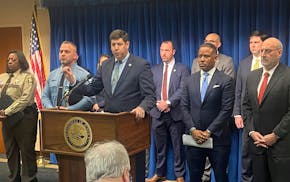Minnesota lawmakers are close to rolling back stringent limits on lead that industry groups say has outlawed the vast majority of key sales in the state.
The limits on lead and cadmium, pushed by the Minnesota Pollution Control Agency, were passed in 2023 as part of a massive 400-plus page environmental budget bill and covered a host of materials and goods including jewelry, toys and clothing.
While key sales have continued since the new limits took effect last year, business interests are now pushing for them to be repealed. They argue the limits are the toughest in the world and make it illegal to sell or replace keys for houses, vehicles, boats and other locks.
"The Minnesota impact really is deep and wide reaching," Bruce Nustad, president of the Minnesota Retailers Association, said at a Tuesday morning Capitol press conference.
MPCA officials say there's been no formal enforcement of the strict new limit. Kirk Koudelka, an assistant commissioner, said they are also proposing a three-year transition period.
"We're willing to work on this," Koudelka said.
But lawmakers are considering a complete and permanent carveout of keys and some artists' materials from the 2023 law. The full Senate has approved an exemption for keys and some artists' materials that contain cadmium as part of the commerce budget bill. It will also be included in a broader environment bill, said Sen. Grant Hauschild, DFL-Hermantown.
"We passed legislation that I think has had unintended consequences," Hauschild said of the 2023 law at the news conference.
A similar bill exempting keys stalled in the House, but supporters are hopeful the provision will be adopted by conference committees that will reconcile differences between House and Senate bills.
Koudelka, the MPCA assistant commissioner, said state research has found that keys were the source of elevated blood lead levels in 15 investigations of children between 2015 and 2019. Lead is toxic in any concentration and young children are especially vulnerable, research shows.
Manufacturers such as Toyota and Honda Marine have developed keys with extremely low lead levels that meet Minnesota's standards, Koudelka said, suggesting there's a path to compliance for all businesses.
But industry groups and business owners said it's not a simple transition. Rob Justen, the owner of Doyle Security Products in Minneapolis, said keys and locks need to be made from the same material to avoid damage, which makes the creation of low-lead replacement keys for existing locks difficult.
"The manufacturers that I do deal with, they say at this point there's not a commercially viable option," Justen said.
The fact that some large manufacturers have already developed keys with extremely low lead levels suggest the larger market is a better force for change than Minnesota lawmakers, said Rep. Bjorn Olson, R-Fairmont.
"The state of Minnesota and the 5.5 million people who live here is not going to be the catalyst that makes this happen," Olson said.

Minnesota Muslims celebrate Eid al-Adha. What is the holiday?

Accomplished climber, photographer who recently moved from St. Paul missing on mountain

Walz: State had no advance notice of federal raid in Minneapolis

DOGE cuts federal money for upgrades at Velveeta plant in New Ulm

